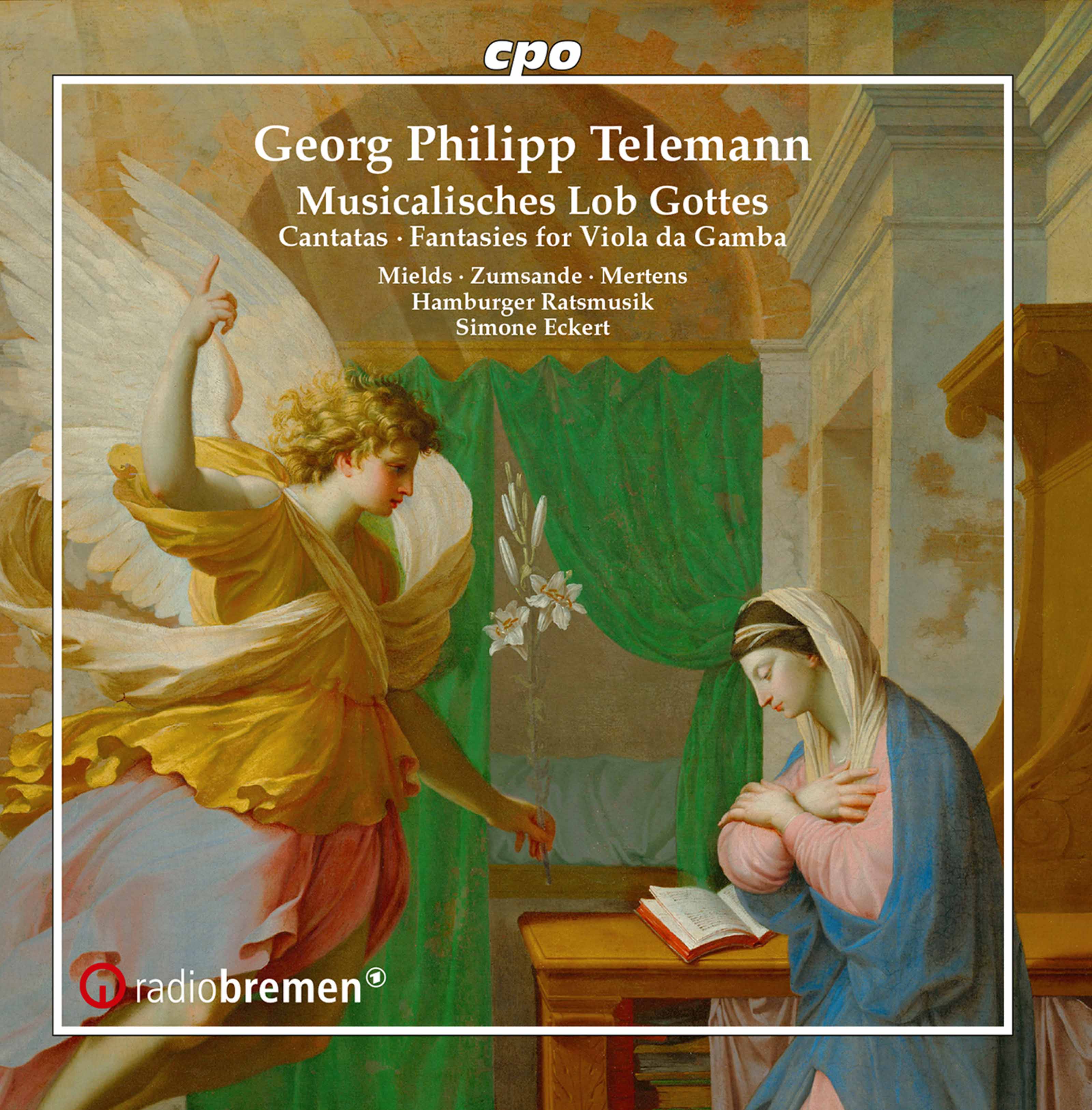Telemann Musikalisches Lob Gottes
A magnificently balanced, enriching disc, performed throughout at the very highest level.

This is a really great idea: Telemann Cantatas performed in an intimate way (as would have been the case at the time) coupled with the most intimate chamber music of all: works for solo instrument, here Fantasies for Viola da Gamba that seem to equate to the great solo works for violin and for cello by J. S. Bach himself.
Telemann wrote several cycles of annual cantata cycles, and published three of them. A fourth print iincludes excerpts form a cycle, and that was the Musikalisches Lob Gottes in der Gemeine des Herrn. We can hear how successful Hamburger Ratsmusik's approach under Simone Eckert is in the opening, joyous Chorus " to the first Cantata, Jauchzet, ihr Himmel,TWV 1:957/23 (just listen to teh wonderful chormatic descent at the end and try telling anyone that Telmannwas an uninspired composer!):
Listening to the Chorales (two per cantata, the second and fifth movements) projects a perfect sense of peace:
We've met soprano Hanna Zundande before (see xxxxx): here she shines in the aria "Meines herzens Lust und Freud," with the instrumentalists going into a decidedly dance mode:
This first cantats is a joyous one: "Sing, Ye Heavens!" is the title. The introsepction of the solo viol Fantasias is the perfect counterpart, and Simone Eckert (who also direvts the choral performances) is the soloist. Initially, he pairs two contrasting Fantasias, one in C minor, the other D major. The C minor alternates Adagio and Allegro effectively:
It is quite a change to hear the bright D major in the next Fantasia. Eckert's playing is marvellous, very stylish and his technique is stunning:
and yet the Andante of this D major Fantasia. is beautifully touching, the final Presto (this one comprises four movements) real tour de force from Eckert.
Not only are the three cantatas here structured similarly, but they have near-identical durations (between 18 and 19 minutes). The second, Gedenke doch, wie ich so elend und verlassen (Remember my affliction and my homelessness) is, as the title might suggest, more reflective:
Soprano Dorothee Mields is the soloist in the beautifully pure aria "Meines Herzens Lust und Freude" (My heart's comfort and joy), a piece that seems to have a decidedly Bachian slant to soe of the string gestures:
The fragility of the chorale "Lässt sich's gleich" (If his goodwill is hidden in night) seems to contrast with the remarkably active aria "Ich lasse dich nicht, du segnest much denn" (I will not let you go before you bless me) with its superb Baroque violin obbligato from Christoph Heidemann:
At the end of the canatta, the "Chorus dacapo" makes a huge effect, beautiful, pure, the perfect act of symmetr, out of which emerges the final pair of viola da gamba Fantasias, again a minor-major pairing, this time E minor to F major. The E minor is less overtly despairing than the C minor. Eckert's virtuosity in teh Presto second movement of the E minor (TWV 40:28) is remarkable:
Coming to the final cantata, "Dies ist der Tag, den der Herr macht" (This is the day the Lord has made), this taes us to the Feast of the Annunciation (March 25: the event shown on teh disc cover). There is a real sense of underlying joy to the three-part counterpoint in the opening Chorus (dare I say it, in a way J. S. B. could rarely attain to this level?!). And just listen to the tightest of soprano ornaments at the close of the chorus - delightful!:
The soprano s0loist in this cantata is Hanna Zumsande (who previously impressed in Graun's opera, Polydorus). Her aria (fairly extended at just under six minutes) "Jauchzet, ihr Himmel" reveals that lovely glint to her voice, and the way she handles Telemann's agile writing is a delight (as are the violins' "comments" on the vocal line and the agile basso continuo):
The brightness - not uncomfortable for a second - from Zumsande's voice is perfect for this cantata, itself the ideal conclusion to this marvellous disc.And how touching the final Chorus dacapo; its end hangs in the air, satisfyingly, a most delicious afterglow.
A magnificently balanced, enriching disc, performed (and recorded) throughout at the very highest level.
